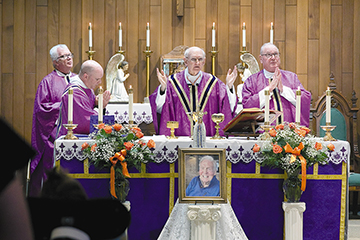
COTTAGE GROVE — The Honorable Francis J. Shakespeare, Jr., former U.S. Ambassador to the Holy See under President Ronald Reagan (1986-1989), died on December 14, 2022, at the age of 97.
Shakespeare and his family have resided in the diocese and he frequently attended Mass at St. Patrick Church in Cottage Grove.
On August 17, a Memorial Mass was celebrated for the repose of the soul of Shakespeare at St. Patrick Church, with Cardinal James M. Harvey, Archpriest of the Papal Basilica of St. Paul Outside the Walls, as the principal celebrant; Cardinal Timothy M. Dolan, Archbishop of New York, concelebrating and as homilist; and Bishop Donald J. Hying of Madison and priests of the Diocese of Madison also concelebrating.
The church was filled to capacity, with the need for extra seating for those gathered to pray for the soul of Shakespeare and for his entire family.
Born in New York City on April 9, 1925, to Francis and Frances Shakespeare and raised in the Catholic faith, Shakespeare graduated from the College of the Holy Cross in 1946. He also served in the U.S. Navy from 1945 to 1946.
Shakespeare was vice president of CBS during much of the 1960s.
He was a media consultant for President Richard Nixon and was later appointed by him as director of the United States Information Agency.
In 1981, President Ronald Reagan named him chairman of the board for International Broadcasting, the entity that oversaw the operations of Radio Free Europe.
Shakespeare held this position until 1985 when Reagan appointed him United States Ambassador to Portugal.
The following year, in September 1986, Shakespeare was appointed United States Ambassador to the Holy See.
His legacy
Cardinal Dolan’s homily focused on Ambassador Shakespeare’s faith and Christocentric worldview, noting, “We honor a man grounded in eternity, whose enduring values came from his faith. You see, this grounding in eternity gave Ambassador Shakespeare the long view. Simply put, he believed that history was, as a matter of fact, His story — God’s story . . . Without any haughtiness, we realize we’re summoned to be agents of the Lord’s purpose in history . . . only to see ourselves in that divine drama is our call — an invitation Frank accepted and passionately lived out.”
He described Shakespeare as “a noble man with an expansive, wide view of the past and the possibilities of the future. A wide view of history with Jesus Christ at its center; Jesus Christ the same yesterday, today, and tomorrow; the Alpha and the Omega; the Way, the Truth, and the Life; ‘the answer to the question posed by every human life,’ as the ambassador was so fond of quoting Pope John Paul II.
“Now, providentially, Frank Shakespeare met a fellow believer in a gentleman named Ronald Reagan, who, like Frank, believed that we are both actors in a script written by God, who has a plan, sometimes hidden, at times discarded by the obstinacy of his creatures, but a plan that would triumph. No wonder President Reagan was fascinated by his ambassador to Portugal, one Frank Shakespeare, who would tell him of the 1917 apparition of the Mother of Jesus to three little shepherd children in a village outside Lisbon called Fatima.”
Most notable for the Catholic community, and to modern/Cold-War history buffs, is his time as Ambassador to the Holy See, especially following his time in Portugal.
He served the leader of the free world as his ambassador to the Polish pontiff of the Catholic Church, and as facilitator and translator of all things Catholic and Marian (especially regarding Our Lady of Fatima) in the days immediately leading to the fall of the Soviet Union.
It’s difficult to overstate the pivotal role he played in the relationship between the kindred spirits, kindred souls of St. John Paul II and President Ronald Reagan, and their unified alliance in the late 1980s.
In Paul Kengor’s book A Pope and a President, he quotes Mr. Shakespeare telling how the Pope would have brought up Fatima to President Reagan, saying “[f]or anyone to talk to me in depth about foreign policy, about Russia, about the Cold War, they will need to understand my thinking and relationship to Mary and also Mary’s appearance at Fatima and the whole relationship between Mary and Russia and the Cold War . . . So, if someone is going to talk to me about foreign policy, Mr. President, you will need to understand that. You will need to understand this and how it relates to my foreign policy.”
This is where Shakespeare’s understanding of his faith and Our Lady became invaluable to the president and arguably to the world. When taking the position as U.S. Ambassador to Portugal, he wanted to be “Ambassador to Fatima.”
In his role as U.S. Ambassador to the Holy See, he became America’s “Ambassador to Fatima” between St. John Paul II and President Reagan.
Pray for the repose of the soul of the Honorable Francis J. Shakespeare, Jr.
Eternal rest grant unto him, O Lord, and let perpetual light shine upon him. May his soul and the souls of all the faithful departed, through the mercy of God, rest in peace. Amen.
Paul Kengor’s book A Pope and a President is quoted throughout this article, along with Cardinal Dolan’s homily at the August 17 Memorial Mass for Ambassador Shakespeare. A special thank you to the Shakespeare/Manning family for their gracious invitation to attend the Memorial Mass and pray for Ambassador Shakespeare.

